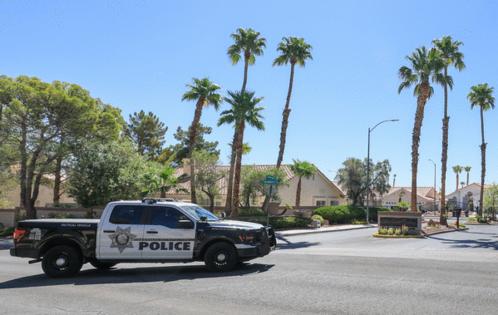Emergency mental crisis holds won't stop gun purchases in Nevada
Published in News & Features
LAS VEGAS — In Nevada, being placed on an emergency mental health crisis hold is not enough to prevent you from purchasing a gun in the future, experts say.
Questions have been raised about how Shane Tamura, a 27-year-old Las Vegas man, obtained a gun to carry out a mass shooting in a New York City skyscraper on Monday, killing a New York Police Department officer and three civilians before turning the gun on himself. Tamura purchased an AR-15-style rifle used in the shooting from his supervisor at the Horseshoe Casino for $1,400, police have said.
It was not immediately clear if the gun sale was legal, The Associated Press reported on Wednesday. The person who sold the gun to Tamura has been cooperating with police and has not been charged with any crimes.
Police have also said Tamura legally purchased a revolver in Nevada on June 12 using his concealed carry permit.
A report obtained from Nevada’s Criminal History Repository shows nothing that would have disqualified him from purchasing a gun.
The repository is used in criminal background checks conducted when someone purchases a gun in Nevada. The report, obtained by the Las Vegas Review-Journal through a public records request, indicates that Tamura’s “firearm disqualified status” was unknown. The designation is used to flag whether someone can purchase a gun, but an “unknown” tag does not mean that the sale is not allowed.
The report does not include any information that Tamura had been placed on a court-ordered involuntary commitment in a mental health facility, which could have prevented him from purchasing a gun. Some repository data may be considered confidential under Nevada law.
NYPD Commissioner Jessica Tisch has said Tamura has a “documented mental health history.”
Tamura left a suicide note in which he blamed football and the NFL for his perceived struggle with chronic traumatic encephalopathy, a neurodegenerative disease. Another suicide note was found in his Las Vegas home, police said Wednesday, along with psychiatric medication, an epilepsy drug and an anti-inflammatory drug prescribed to Tamura, The Associated Press reported.
The victims of the shooting include NYPD Officer Didarul Islam, Blackstone investment firm executive Wesley LePatner, security officer Aland Etienne and real estate firm worker Julia Hyman.
ABC News, citing unidentified law enforcement sources, reported that Tamura was placed on two “mental health crisis holds” in Nevada, in 2022 and in 2024.
Since 2020, licensed and unlicensed gun sellers have been required to conduct background checks when selling a gun in Nevada. Someone could be prevented from purchasing a gun if they have a felony criminal conviction or have been involuntarily committed to a mental health facility by a court order.
Long-term involuntary commitments to a mental health facility are required by law to be reported to the repository.
Tamura was arrested in 2023 on suspicion of trespassing at Red Rock Resort, but the Clark County district attorney’s office declined to prosecute the misdemeanor charge, court records show. The arrest was the sole criminal incident listed in the repository report.
Natasha Mosby, a licensed clinical social worker and clinical program director of UNLV’s Nevada Pediatric Access Program, said emergency mental health holds, also known as a “Legal 2000” or “L2K” hold, do not appear in a statewide database used in background checks for gun purchases.
“You do not report for an L2K,” said Mosby, who has previously worked in Las Vegas psychiatric hospitals. “That doesn’t go on their background check.”
Officials including law enforcement officers, doctors, psychologists, therapists, social workers and nurses can place someone on a Legal 2000 hold, but that is not considered to be a court-ordered involuntary commitment.
Instead, when someone is placed on a Legal 2000 hold, they must be released from the psychiatric hospital within 72 hours unless a petition is filed with a court, asking court-affiliated doctors and a judge to evaluate the case. The judge can then decide to involuntarily commit that person.
Mosby said short-term commitments of less than 30 days are also not reported to the database used in gun purchase background checks.
Someone who is placed on an emergency Legal 2000 hold is not always going to be placed in front of a judge. The patient can decide to voluntarily admit themselves to a psychiatric hospital, or a doctor can order them to be discharged before the court hearing, Mosby said.
She said it’s “not uncommon at all” for patients to be discharged from the hospital before seeing a judge.
A court order adjudicating someone mentally ill can also prevent them from purchasing a gun. Those adjudications can come from a judge finding someone incompetent, if someone pleads guilty but mentally ill or if someone is found not guilty by reason of insanity, said Chief Deputy Public Defender Catherine Wiersch, who handles cases in civil commitment court.
“Unless there’s an adjudication of mental illness that gets reported to the Nevada registry, a person can buy a weapon, as long as they meet the other criteria,” Wiersch said.
___
©2025 Las Vegas Review-Journal. Visit reviewjournal.com.. Distributed by Tribune Content Agency, LLC.







Comments